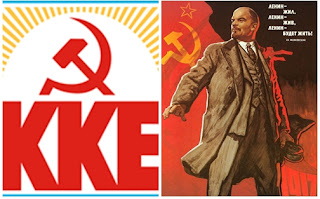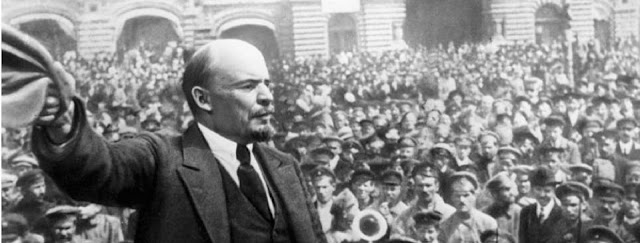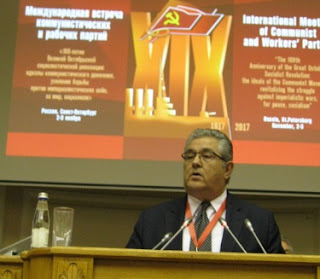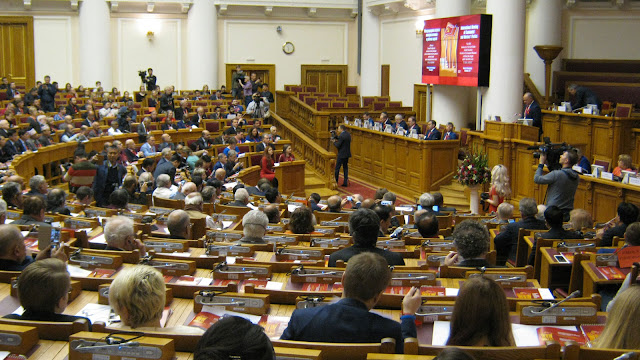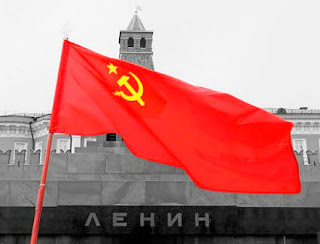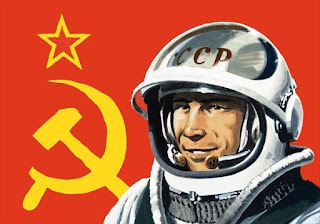Communist Party of Italy.
Contribution at the Scientific Conference in honor
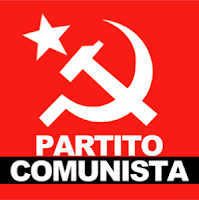
of the 100 years since the October Revolution.
Leningrad, August 10-13, 2017.
A hundred years ago scientific socialism became reality. Until then, Marxism had only been theorized within the First International and applied to the class struggle in conditions of bourgeois domination; after that, it became reality for a short while, during the Paris Commune, showing that the proletarian revolution was not only possible, but even necessary. With the October Revolution, Marxism is applied to building Socialism, as the first step in the construction of the Communist society.
This event gave world’s history an overwhelming impulse. Just to recall some of the main contributions that the USSR gave to the historical revolutionary process: the resistance to the imperialist aggression during the civil war, the push to the construction of Communist parties all over the world, the birth of the USSR and the solution of the problem of nationalities, the collapse of colonialism, the construction of socialism through the proletarian dictatorship and the centralized planning of the economy, the defeat of nazi-fascism by the Red Army and the support to the Partisan movement in Europe and Asia, the fast post-war reconstruction, the high cultural and social level achieved by the people not only in the USSR, but also in the People’s Democracies, the priceless contribution to anti-imperialist and class struggle allover the world.
These facts really changed history and the world. Today, a hundred years after that epic event, communists are called to think about the causes of real socialism’s collapse. Why? The question is simple and the answer is obvious: it would be unrealistic to propose that experience again after a century, if we did not understand the causes of its collapse or if we considered it as an “unavoidable” event, due to intrinsic flaws of the socialist construction.
On the contrary, we want to reaffirm (leaving room to further constructive contributions) the sole real alternative to capitalist barbarity and its substantial burn-out we can witness every day is scientific Socialism, based on the proletarian dictatorship and the centralized planning of the economy. According to our standpoint, this is what was built in the USSR and the People’s Democracies.
If 1917 marks the starting date of that construction, we consider 1953-56 as the starting period of its degenerative decline. Why do we adopt this three years period ? In 1953 Stalin died, and we will consider the events came up just after that and led, in 1956, to crucial congresses (the CPSU XXth in the USSR and the ICP’s VIIIth in Italy) which gave way to the degenerative turn. What did those events cause. Did they suddenly changed the nature of those Parties, which adopted the new political line? Did they suddenly changed the nature of the proletarian states, turning them into bourgeoisie-ruled states? Or did these parties and states keep the way of socialist construction until their collapse in 1989/1991? The two different answers would lead either to reject those experiences since their modification, or to reaffirm their validity up to the last moment of their existence, despite their well known limits.
Emotions do not help in giving an answer to this double-faceted set of questions. How can one sincerely reject the well-educated, united, economically and scientifically developed society, created in the Socialist countries and the people’s democracies? How can one negate their support to the liberation and anti-colonialist movements across the world? How can one overlook the contrast to warmongering imperialism? Turning to Italy, how can one negate the positive role, played by the Italian Communist Party and its sections, which nurtured the class consciousness of millions workers, rescued and strengthened their social rights?
On the other hand, we cannot forget that the Socialist society, as well as the Communist parties, a long before Gorbachev and Occhetto (the last ICP’s secretary general, who proclaimed its dissolution in 1991), were infected by a germ we are still studying. As we are Marx’s disciples, endowed with the instrument of historical materialism, we must connect all political and ideological processes to class and production relations, existing in the society. We must pay attention to both primary and secondary relations.
The ideological clash in the USSR.
Opposite to what, normally, is considered as the “historical truth”, at Stalin’s time the political debate in the USSR was far from being inhibited or paralyzed by “terror”. We can perceive this circumstance by reading one of the last works by Stalin, Economic Problems of Socialism in the U.S.S.R., written of 1952, where he criticized some comrades that were expressing different opinions in full freedom. By reading this interesting text, we can understand the economic debate in the USSR, as it was at that time, as well as its further political evolution.
The two lines.
During the whole period of socialist construction, two main political lines were confronting, revealing different ideological approaches, especially regarding the economic policy. The first line is represented by the line of thought, from Bucharin to Gorbachev, passing through Khrushchev and Kosygin. Bucharin opposed the accelerated end of the NEP, the priority of heavy industry development and the kolkhoz-based collectivization in rural areas, relaunching the concept of individual farms; Khrushchev, in the aftermath of Stalin’s death, sold machines and tractors’ stations to collective farms; Kosygin (and the economists of the 60’s) confirmed Khrushchev’s reforms; this process went on until the announced disaster of Gorbachev, who legalized the parallel economy, allowing it to finally poison the Soviet society, and canceled the leading role of the Party up to Socialism’s dismantling.
The second line is the one carried out by Stalin until his death, which finds full application in the five-year plans, the countryside collectivization and the constantly growing role of the socialized economy, centrally directed and controlled by the working class at the expense of the market’s influence in the Socialist society.
Here, we want to recall another loyal exponent of this line: Andrey Zhdanov. The year before his untimely death in 1948, he chaired the first Cominform’s meeting, where the ground was laid for the response to the growing threat by imperialism, the condemnation of the Titoist betrayal, the criticism of political opportunism of some western Communist parties (the Italian and French parties among the others), and for the acceleration of Socialist construction in the People’s democracies. Stalin’s point of view stems directly from his last work, Economic problems of Socialism in the USSR (February 1st, 1952), where he draws clearly his own vision about the strengthening of the proletarian dictatorship in the USSR and the relations between socialized production and the market.
Among the goals outlined, there is the following: «In order to ensure an economic bond between town and country, between industry and agriculture, commodity production (exchange through purchase and sale) should be preserved for a certain period, it being the form of economic tie with the town which is alone acceptable to the peasants, and Soviet trade — state, cooperative, and collective-farm — should be developed to the full and the capitalists of all types and descriptions ousted from trading activity».
Stalin, as a dialectical materialist, points out the route that the integral implementation of the proletarian dictatorship must follow during Socialism’s construction: commodities’ production for trade in the goods’ market cannot be immediately abolished. The aim is to decisively remove from trading the capitalist conditions and the control over it. Stalin goes on: «It is said that commodity production must lead, is bound to lead, to capitalism all the same, under all conditions. That is not true. Not always and not under all conditions! Commodity production must not be identified with capitalist production. They are two different things. Capitalist production is the highest form of commodity production. Commodity production leads to capitalism only if there is private ownership of the means of production, if labour power appears in the market as a commodity which can be bought by the capitalist and exploited in the process of production, and if, consequently, the system of exploitation of wageworkers by capitalists exists in the country. Capitalist production begins when the means of production are concentrated in private hands, and when the workers are bereft of means of production and are compelled to sell their labour power as a commodity. Without this there is no such thing as capitalist production.
Consequently, our commodity production is not of the ordinary type, but is a special kind of commodity production, commodity production without capitalists, which is concerned mainly with the goods of associated socialist producers (the state, the collective farms, the cooperatives), the sphere of action of which is confined to items of personal consumption, which obviously cannot possibly develop into capitalist production, and which, together with its “money economy,” is designed to serve the development and consolidation of socialist production».
What Stalin is saying here is that production, not distribution, does determine the real nature of the society. The market existed well before capitalism and could last even under a socialist economy for a certain period, but only if the relations of production are held firmly by the working class and the market is not allowed to generate new forms of capitalist accumulation, that impede Socialism or conflict with it. The various “if”‘s in italic Stalin puts in his discourse to underline the necessary conditions, are real nails in the coffin of capitalism, but they have been torn away one by one after his death.
In the following passage, Stalin approaches the issue of the Law of value. This law states that the commodities’ value entirely lies in the amount of human labor therein, either as previously accumulated labor (dead work) or, as newly incorporated labor through the current productive cycle (living work). Does this law exist and how does it operate under socialism? Stalin answers: «It is sometimes asked whether the law of value exists and operates in our country, under the socialist system. Yes, it does exist and does operate. Wherever commodities and commodity production exist, there the law of value must also exist. In our country, the sphere of operation of the law of value extends, first of all, to commodity circulation, to the exchange of commodities through purchase and sale, the exchange, chiefly, of articles of personal consumption. Here, in this sphere, the law of value preserves, within certain limits, of course, the function of a regulator. But the operation of the law of value is not confined to the sphere of commodity circulation. It also extends to production. True, the law of value has no regulating function in our socialist production, but it nevertheless influences production, and this fact cannot be ignored when directing production. As a matter of fact, consumer goods, which are needed to compensate the labour power expended in the process of production, are produced and realized in our country as commodities coming under the operation of the law of value. It is precisely here that the law of value exercises its influence on production. In this connection, such things as cost accounting and profitableness, production costs, prices, etc., are of actual importance in our enterprises. Consequently, our enterprises cannot, and must not, function without taking the law of value into account.
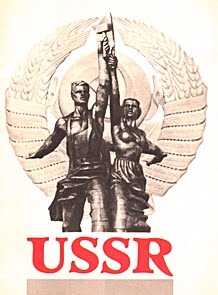
Is this a good thing? It is not a bad thing. Under present conditions, it really is not a bad thing, since it trains our business executives to conduct production on rational lines and disciplines them…. But does this mean that the operation of the law of value has as much scope with us as it has under capitalism, and that it is the regulator of production in our country too? No, it does not. Actually, the
sphere of operation of the law of value under our economic system is strictly limited and placed within definite bounds. It has already been said that the sphere of operation of commodity production is restricted and placed within definite bounds by our system. The same must be said of the sphere of operation of the law of value. Undoubtedly, the fact that private ownership of the means of production does not exist, and that the means of production both in town and country are socialized, cannot but restrict the sphere of operation of the law of value and the extent of its influence on production. In this same direction operates the law of balanced (proportionate) development of the national economy, which has superseded the law of competition and anarchy of production. In this same direction, too, operate our yearly and five-yearly plans and our economic policy generally, which are based on the requirements of the law of balanced development of the national economy. The effect of all this, taken together, is that the sphere of operation of the law of value in our country
is strictly limited, and that the law of value cannot under our system function as the regulator of production. … Value, like the law of value, is a historical category connected with the existence of commodity production. With the disappearance of commodity production, value and its forms and the law of value also disappear. In the second phase of communist society, the amount of labour expended on the production of goods will be measured not in a roundabout way, not through value and its forms, as is the case under commodity production, but directly and immediately – by the amount of time, the number of hours, expended on the production of goods. As to the distribution of labour, its distribution among the branches of production will be regulated not by the law of value, which will have ceased to function by that time, but by the growth of society’s demand for goods. It will be a society in which production will be regulated by the requirements of society, and computation of the requirements of society will acquire paramount importance for the planning bodies.
Totally incorrect, too, is the assertion that under our present economic system, in the first phase of development of Communist society, the law of value regulates the “proportions” of labour distributed among the various branches of production.
If this were true, it would be incomprehensible why our light industries, which are the most profitable, are not being developed to the utmost, and why preference is given to our heavy industries, which are often less profitable, and sometimes altogether unprofitable. If this were true, it would be incomprehensible why a number of our heavy industry plants which are still unprofitable and where the labour of the worker does not yield the “proper returns,” are not closed down, and why new light industry plants, which would certainly be profitable and where the labour of the workers might yield “big returns,” are not opened.
If this were true, it would be incomprehensible why workers are not transferred from plants that are less profitable, but very necessary to our national economy, to plants which are more profitable — in accordance with the law of value, which supposedly regulates the “proportions” of labour distributed among the branches of production. Obviously, if we were to follow the lead of these comrades, we should have to cease giving primacy to the production of means of production in favour of the production of articles of consumption. And what would be the effect of ceasing to give primacy to the production of the means of production? The effect would be to destroy the possibility of the continuous expansion of our national economy, because the national economy cannot be continuously expanded with out giving primacy to the production of means of production.
These comrades forget that the law of value can be a regulator of production only under capitalism, with private ownership of the means of production, and competition, anarchy of production, and crises of overproduction. They forget that in our country the sphere of operation of the law of value is limited by the social ownership of the means of production, and by the law of balanced development of the national economy, and is consequently also limited by our yearly and five-yearly plans, which are an approximate reflection of the requirements of this law. Some comrades draw the conclusion from this that the law of balanced development of the national economy and economic planning annul the principle of profitableness of production. That is quite untrue. It is just the other way round. If profitableness is considered not from the stand-point of individual plants or industries, and not over a period of one year, but from the standpoint of the entire national economy and over a period of, say, ten or fifteen years, which is the only correct approach to the question, then the temporary and unstable profitableness of some plants or industries is beneath all comparison with that higher form of stable and permanent profitableness which we get from the operation of the law of balanced development of the national economy and from economic planning, which save us from periodical economic crises disruptive to the national economy and causing tremendous material damage to society, and which ensure a continuous and high rate of expansion of our national economy.
In brief, there can be no doubt that under our present socialist conditions of production, the law of value cannot be a “regulator of the proportions” of labour distributed among the various branches of production». Why did we report this extensive quotation? Within it, we find the core of the question of the production relations’ regulation in the USSR, lately undermined by the reforms, carried out after Stalin’s death: it was not possible to “revise” the construction of Socialism without bringing into question this point, concerning the essential material basis of Socialist construction. Stalin identifies the role of the law of value in the domain of production rationalization, but he excludes it affects distribution proportions among productive sectors, such as agriculture, heavy and light industry. This proportion can only be fixed in a political way by the Plan, as a goal to be pursued. Can this be realized without taking into consideration technical and economical restrictions and relations within society? Of course, it cannot. I can fix by my will, that I want to reach a certain place by my car: this does not depend on the laws of physics, nevertheless I must take into account the restrictions, imposed by the same laws, like distance, weight, speed, fuel consumption, traffic, etc…
Stalin goes on: «Balanced development of the national economy, and hence, economic planning, which is a more or less faithful reflection of this law, can yield nothing by themselves, if it is not known for what purpose economic development is planned, or if that purpose is not clear. The law of balanced development of the national economy can yield the desired result only if there is a purpose for the sake of which economic development is planned».
In the same text, Stalin had previously stated: «The same must be said of the laws of economic development, the laws of political economy – whether in the period of capitalism or in the period of socialism. Here, too, the laws of economic development, as in the case of natural science, are objective laws, reflecting processes of economic development which take place independently of the will of man. Man may discover these laws, get to know them and, relying upon them, utilize them in the interests of society, impart a different direction to the destructive action of some of the laws, restrict their sphere of action, and allow fuller scope to other laws that are forcing their way to the forefront; but he cannot destroy them or create new economic laws. One of the distinguishing features of political economy is that its laws, unlike those of natural science, are impermanent, that they, or at least the majority of them, operate for a definite historical period, after which they give place to new laws. However, these laws are not abolished, but lose their validity owing to the new economic conditions and depart from the scene in order to give place to new laws, laws which are not created by the will of man, but which arise from the new economic conditions»
Stalin becomes very concrete in answering some comrades. In the first answer, addressed to Alexander Ilic Notkin, he says: «To equate a part of the means of production (raw materials) with the means of production, including the implements of production, is to sin against Marxism, because Marxism considers that the implements of production play a decisive role compared with all other means of production. Everyone knows that, by themselves, raw materials cannot produce implements of production, although certain kinds of raw material are necessary for the production of implements of production, while no raw material can be produced without implements of production. Consequently, it cannot be denied that the law of value does influence the formation of prices of agricultural raw materials, that it is one of the factors in this process. But still less can it be denied that its influence is not, and cannot be, a regulating one».
Here, the eventuality to step back in the construction of Socialism is totally excluded. Socialism here seems to be measured by, not made of, the ratio between socialized economy and the remnants of mercantile economy. The second answer, addressed to L.D. Yaroschenko, is of the greatest importance to understand Stalin’s conception of the relation between subjective factor, the political one, and technical organizational factor: «Comrade Yaroshenko thinks that it is enough to arrange a “rational organization of the productive forces,” and the transition from socialism to communism will take place without any particular difficulty. He considers that this is quite sufficient for the transition to communism. He plainly declares that “under socialism, the basic struggle for the building of a communist society reduces itself to a struggle for the proper organization of the productive forces and their rational utilization in social production.” It is not true, in the second place that the production, i.e., the economic, relation lose their independent role under socialism, that they are absorbed by the productive forces, that social production under socialism is reduced to the organization of the productive forces.
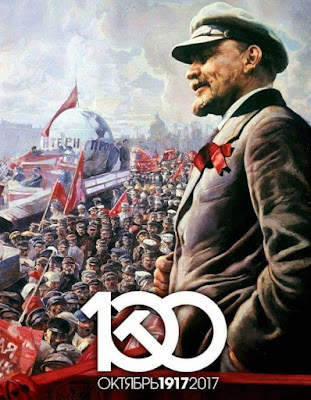
It is necessary, in the second place, by means of gradual transitions carried out to the advantage of the collective farms, and, hence, of all society, to raise collective-farm property to the level of public property, and, also by means of gradual transitions, to replace commodity circulation by a system of products-exchange, under which the central government, or some other social-economic centre, might control the whole product of social production in the interests of society». Here too we can appreciate the two distinctive aspects of Stalin’s thought: primacy of the political will over technical aspects, necessity of a lasting and unceasing guidance towards the limitation of the mercantile area of the production and distribution, in favor of socialized production and distribution.
In the third answer, to A.V. Sanina e V.C. Vensger, Stalin focuses on a technical issue, which will later acquire a great political value during Khrushchev’s reformation period. «Assuming for a moment that we accepted Comrades Sanina’s and Venzher’s proposal and began to sell the basic implements of production, the machine and tractor stations, to the collective farms as their property. What would be the outcome? The outcome would be, first, that the collective farms would become the owners of the basic instruments of production; that is, their status would be an exceptional one, such as is not shared by any other enterprise in our country, for, as we know, even the nationalized enterprises do not own their instruments of production. Can it be said that such a status would facilitate the elevation of collective-farm property to the level of public property, that it would expedite the transition of our society from socialism to communism? The outcome would be, secondly, an extension of the sphere of operation of commodity circulation, because a gigantic quantity of instruments of agricultural production would come within its orbit.
Would it not be truer to say that our advance towards communism would only be retarded by it? Comrades Sanina’s and Venzher’s basic error lies in the fact that they do not understand the role and significance of commodity circulation under socialism; that they do not understand that commodity circulation is incompatible with the prospective transition from socialism to communism.
They evidently think that the transition from socialism to communism is possible even with commodity circulation, that commodity circulation can be no obstacle to this. That is a profound error, arising from an inadequate grasp of Marxism.
What, then, does the collective farm own? Where is the collective-farm property which it disposes of quite freely, at its own discretion? This property of the collective farm is its product, the product of collective farming: grain, meat, butter, vegetables, cotton, sugar beet, flax, etc., not counting the buildings and the personal husbandry of the collective farmers on their household plots. The fact is that a considerable part of this product, the surplus collective-farm output, goes into the market and is thus included in the system of commodity circulation. It is precisely this circumstance which now prevents the elevation of collective-farm property to the level of public property. It is therefore precisely from this end that the work of elevating collective farm property to the level of public property must be tackled. Such a system, by contracting the sphere of operation of commodity circulation, will facilitate the transition from socialism to communism». It is impossible to be clearer.
What happened after Stalin’s death, when Khrushchev’s reforms started? As a first step, machinery and tractors’ stations were sold to Kolchoz. This laid the foundations for the restoration of capitalist accumulation in the USSR. What happened after Khrushchev’s removal from office on October 15th, 1964, when the Presidium of the Supreme Soviet accepted his resignation from the leadership? The policy to withdraw from the full social property of the means of production and the restrictions to mercantile commodity circulation went on. Here we cite an article by the economist E. Liberman, appeared on Novosti, November 9th, 1964. “Stimulated in pursuing high revenues, the enterprise itself will find in its plans the best ratio between quantitative and qualitative indexes. It will become easier, then, to fulfill the basic principle, upon which what is important for society must be important for every single corporation and worker. […] when the necessity of a substantial renovation of the planning system will come to evidence, it will be necessary to elaborate a sole general criterion, free from both corporate concepts and subjective stratification” (Piano e profitto nell’Economica Sovietica, Editori Riuniti, 1965, pp. 163-166).
Under the pretext, that the centralized planning was too “rigorous and inefficient”, a line of lack of principles and exclusive attention to indexes was adopted and liberalism started affecting Soviet economy. Contrary to Stalin’s standpoint, the task was no longer to achieve the fixed goal, but to move in the most “efficient” way, no matter in what direction. Just to refresh the example of the car trip, it’s like if the driver were now following the most rapid route without a precise destination: the only important thing is the lack of traffic or heavy slopes.
The fateful 1953.
The events following Stalin’s death and those before the XXth Congress are actually impressive. Here we list them following a geographical criterion just to highlight the impact they had not only on the USSR, but also on People’s democracies, as well as on the respective Communist and Workers parties, just to give an idea of the earthquake occurred.
USSR.
In the immediate aftermath of Stalin’s death, Lavrenti Beria, one of his nearest collaborators, was imprisoned and sentenced to death. Notwithstanding the infamous accusation of being a spy of British imperialism and other charges later invented by Kruschev, Beria had been the leader of Soviet intelligence that put an end to repressions started in 1937, for which Ezhov was the major responsible.
Differently from the Moscow trials, which condemned the block of Bucharin, Zinoviev and Kamenev after legal trials, about which we have detailed information, charge proofs against Beria were never provided.
Poland
Bolesław Bierut, Komintern’s officer in the USSR (back in Warsaw in 1943), was one of the commanders during the anti-nazi Resistance, and the first President of the People’s Republic of Poland (1947-1952). After the Presidency, he substituted Władysław Gomułka as the Secretary General of the Unified Polish Workers Party and appointed Prime Minister (1952-1954). He died in Moscow, while heading the Party’s delegation to the CPSU XXth Congress. Władisław Gomułka was accused of “nationalist deviationism”, removed from all his offices
(1948-1949), expelled from the Party (1949) and imprisoned (1951). Released in 1954 and rehabilitated in 1956, he was re-elected Secretary General of UPWP and the following year became member of the State Council. He started his own reforms program, based on the idea of a “national way to Socialism”.
Hungary.
Mátyás Rákosi was the Secretary General of the Hungarian Communist Party between 1945-1956. He took part in the government held by Béla Kun under the Soviet Hungarian Republic; after its fall, he fled to the USSR, where he became one of the leaders of Comintern. In august 1952, Rákosi was appointed Prime Minister, but on June 13th 1953, he was invited to Moscow and obliged to resign in favor of Imre Nagy. In January 1955 the CPSU Politburo again summoned at the Kremlin all the Hungarian leaders and violently attacked Nagy. However, a few months after the XXth congress, in July 28th 1956, Rákosi was obliged to resign from the Party Secretariat, and to sign a humiliating self-criticism, where he took upon himself the absurd responsibility for the events that will occur shortly later in Hungary.
Czechoslovakia.
Klement Gottwald. One of the founders of the Czech Communist Party, Secretary General of the KSČ from 1929 to 1945 and Comintern Secretary from 1935 to 1943. Between 1945 and 1946 he was deputy Prime Minister, then Prime Minister until 1948 and President from 1948 to 1953. Gottwald died in 1953 in Moscow, only five days after Stalin’s funerals, in which he took part, on
March 9th.
DDR.
Walter Ulbricht. He has been heading the illegal Communist Party during Nazism, then he fled to Paris and in 1938 moved to Moscow. After the German invasion of the Soviet Union in June 1941, Ulbricht was one of the leaders of the Comintern. After Stalin’s death, on March 5th 1953, Ulbricht was charged with cult of personality.
Italy.
Pietro Secchia. One of the undisputed leaders, along with Luigi Longo, of the Italian antifascist Resistance. In December 1947, Secchia traveled to Moscow and had long conversations with Zhdanov and Stalin, being entrusted with forwarding their harshest criticisms about the guidance of the Italian Communist Party, led by Togliatti. This criticism are confirmed by the hard fight Secchia engaged inside the leadership of the ICP.
«I do not propose», Secchia said, «to change our line or to adopt two lines, but we must not deceive ourselves, we must be conscious that this fight becomes more and more difficult… We must think about broader, harder and firmer fights, [without excluding the possibility of] being engaged in the near future in a fight different from the legal one, in a violent fight against reactionary groups, keeping in mind that the sole way to achieve victory is to act through broad unitary actions…». He concludes: «Today, the Italian situation, in my opinion, is still favorable for unleashing an offensive, we have forces to do this and, if the enemy will try to block us by violence, we still dispose of such a force potential to break their violence and lead the Italian workers to the final victory».
This policy was reported, in Italy, at the VIth Congress of the Italian Communist Party, which took place in Milan on January 4th, 1948. The report is heavily self-critical, «it reflects the criticism from the outside» Secchia contentedly commented, and warning against “constitutional illusions”, he alerted: «We follow a democratic line, but we will not let any provocation, any reactionary plan to take us unprepared. We acquired the experience of the partisan war». In that moment, no need was to add anything more to be clearly understood by those delegates. The new Central Committee, in its first session, elects the Party’s Directing Committee, the Secretary General and the Vice-Secretary. Togliatti and Longo were confirmed again in these positions. Anyway, this decision caused Secchia’s protest and a firm disappointment of the CPSU, to the extent Togliatti was obliged to find an immediate solution. Without even waiting for a new session of the C.C., Togliatti wrote a letter to the CC members, for them to immediately vote Secchia for Deputy Secretary General, along with Longo. Secchia was the Head of the Organization Department of the CC and, under his leadership, the Party reaches its highest political and organizational point, with two million members. “In the history of the Italian movement there never have been such a spontaneous, compact and extended general strike like the one of July 14-16th, 1948», Secchia commented after the attempt against Togliatti. The strike of July 14th had just been the first “great demonstration of unity, of class and national consciousness” and others will come. “The party – Secchia continued -, “has become under the ideological, political and organizational point of view thanks to this strike”. In 1954, the Seniga affair (Seniga was Secchia’s closest assistant, who fled away with the Party’s cash and many important documents) weakened Secchia’s position to the extent that he had to resign from the Organization Department, being excluded from the Secretariat too. Secchia also, like Rakosi, had to sign a humiliating self-criticism which paved the way for the final victory of Togliatti’s line.
Criticisms against the USSR.
Criticism against the USSR is not new and comes from the most different sources. Here, we want to briefly report the one by the Trozkyite wing, which broke up with the party a long before 1953, and the one by the Maoist wing, just to clarify the distance between us and them: a sidereal distance from the former, and a considerable one from the latter.
The Trozkyite wing.
As it is notorious, Trozky was used to talking of “Degenerated workers’ State”, accusing the bureaucratic “caste” which allegedly came to power after his expulsion. In the following years, Trozky himself had to admit the non-scientific character of the term “caste” and its scarce adherence with Marxist theory, given that it does not describe any kind of production relation. It is like saying that society is founded on theft: it’s a commonplace that does not describe who produces, what produces and why he does that. Coming back to Trozky’s “caste” theory, we find out that it is defined not as a class, but as a generic category of people, identified through sociological and psychological aspects. This theory unveils the personal aversion of its author to the Soviet leading group, who had reduced him to a scant minority, basing on a clear political line.
Trozky’s disciples are more refined and they are well aware of this serious gap. They defined the “caste” as a true class that imposes exploiting production relations on Soviet society, replacing the old bourgeoisie. According to this view, Socialism would have created a new class of appropriators of surplus value, produced by the working class. This interpretation is hardly justifiable from a Marxist point of view. In fact, in the USSR the property of the means of production was not private but public and, consequently, any kind of appropriation by the “caste” would have had the character of mere individual appropriation, not of capitalist class exploitation.
This question does not scrape Trozkyite critics, who solve the problem in the most simple way ever: by inventing new specially-made categories. As property belongs to the Soviet State, thus, we are talking of “State capitalism”, tracing back to Lenin’s definition of a completely different historical period, like the one of the NEP. No matter if there is no production of goods for profit to be realized on the market. The “Caste” is not the capitalist bourgeoisie? It does not matter: they coin the definition of a new class and new production relations, allegedly created by socialism, inventing a new stage, “more” supreme than imperialism. What does really matters for them is to “imitate” some Marxist and Leninist concepts, with no care of their coherence with the rest of the theory.
Titoism belongs to the same category of opponents, who collided with the socialist field in 1948. Here too, arguments stand on a non-scientific level, focused on distribution aspects with no connection to production relations, often resulting in pure tautology (“Capitalist State strengthens capitalism, Socialist State strengthens Socialism”).
All these gaps do not escape to more able Trozkyite thinkers, who are more used to Marxist theory, such as Ernest Mandel. He highlights that some features of capitalism are lacking in the USSR: the law of the maximum profit, that pushes capitalists to invest in the most profitable sectors, does not operate, since the heavy industry is more favored; there are no capital exports, no economic cyclic crises, no private international trade, no reserve army of labor.
In our opinion, these features have been existing in the USSR more or less until Gorbachev’s reforms. However, Mandel too, at least, is obliged to take shelter in the distribution issue. Obviously, in order to give these ghosts substance, he too was obliged to invoke “the exclusion of proletarians from corporate administration”, “the regime of terror and espionage” and the “soviet expansionism”, up to the most vulgar lies from the dirtiest bourgeois trash. Our duty is to clean away the waste, tossed on real socialism.
The Maoist wing.
The other wing that opposed the USSR after the XXth Congress was the one led by the Chinese Communist Party, headed by Mao Tzetung, and by the Albanian Party of Work, headed by Enver Hoxha.
The controversy came out gradually, about Stalin’s heritage defense and the concept of peaceful coexistence. Actually, the controversy did not patently came out until 1960. A record from the Moscow Conference between the 81 Communist and Workers parties says: «The popular republics of Albania, Hungary, Germany, Viet Nam, China, Korea, Mongolia, Poland, Romania and Czechoslovakia, together with the great Soviet Union, constitute the mighty socialist field» And «The Communist and Workers Parties unanimously declare that the Communist Party of the Soviet Union has been and still is the universally recognized vanguard of the world Communist movement, being the most expert and trained contingent of the international Communist movement …
The historical resolutions of the XXth CPSU Congress are not only of great importance for the CPSU and for the construction of Communism in the USSR, but they also started a new stage of the worldwide nCommunist movement, promoted and developed on the ground of Marxism-Leninism». The controversy initially mounted in an indirect way, without mentioning parties and leaders, then it became more stinging, by attacking such leaders, as Togliatti in 1962/1963 and Khrushchev in 1964, accusing him of being a revisionist (the Work Party of Albania already did that in 1962). Soviets replied with the counter-charge of breakaway activity.
Later, the controversy turned from ideology to the relationship between states, leading to the breach of diplomatic relations and trade cooperation. We will not mention here the breach between the Workers Party of Albany and the Communist Party of China after Mao’s death and the criticism by Enver Hoxha of the Cultural Revolution in China. We want to focus on some aspects of the Sino-Soviet controversy. From an ideological point of view, the Maoist criticism on the subject of the Soviet system after Stalin could be closer to our criticism of opportunism from Khruschev to Gorbachev, but the mode it took since the second half of the ’60s is unacceptable.
First, the charge of the USSR with “social-imperialism” does not have any Marxist scientific basis. In the USSR, until 1988, if a primitive capitalist accumulation existed, it was far from being dominant and, in any case, from the five features identifying imperialism, according to Lenin. The “Hoxhaist” version, according to which Kruschev wanted to impose on Albanians the construction of Socialism without the working class, by placing Albania in a given sector of the division of labor and cooperation within the Socialist area, reports a typical opportunist attitude, lacking in ideology, that focuses on the result without considering who, for whom, why and how that result should be achieved. This kind of argument in any case cannot define the USSR as an imperialist power.
In the 70’s the Maoist-Hoxhaist wing charged the Soviet leading group with the accusation of having turned the country of Socialism into a fascist one, dominated by a a bureaucratic-militarist “caste”. The absurdity of this charge is evident and it is not necessary to waste time in objecting that even basic prerequisites, supporting this thesis, do not exist in the real world. At the end of Mao’s life, Chinese policy became more and more embarrassing. This circumstance became evident not only with the rupture with the Socialist field, that such leaders as Kim Il Sung and Ceausescu tried to prevent, but also later, with the “thawing” towards the USA. Until that point, the Chinese Communist Party was accusing the USSR of being too submissive to imperialism. After the growth of the controversy, the USSR became the “main enemy”, considered more “aggressive” than the USA, that were supposed to be in a defensive position. Among the other consequences, this deviation led China to undermine the support to anti-colonial movements, as it happened in Angola. The crisis of relations with the USSR resulted also in a territorial dispute along the Siberian
border.
Our analysis.
In the following lines, we propose our own arguments about the reason of socialism’s fall in the USSR and the People’s democracies. The analysis starts from an economic examination of the evolution (or involution) of society, with the creation of a parallel economy out of public control, which allowed capital re-accumulation and the re-organization of a reborn bourgeoisie in antisocialist
political groups.
These groups, skillfully supported by western imperialism, initially infiltrated the Party, undermining its authority and prestige, then led it to a substantial incapacity of ruling society. How could those people and those ideas rise and make their way in the Party and Soviet society?
In our opinion, the answer is the following:
– In Socialist society interests, opposing the full enforcement of the proletarian dictatorship, continue to exist. We are not talking of the big agrarian and industrial bourgeoisie, which was eliminated, but small dealers and businessmen, who find the possibility to realize an original wealth accumulation, which cannot be defined as a capitalistic one yet;
– these groups, small but powerful and wealthy, find are connected to the “economicistic” wing of the Party. This wing is not Marxist-based, it lacks in principles and prioritizes results rather than values, the amount of road traveled rather than the direction taken. It is basically wanting to get out from the working class dictatorship;
– these two groups, supporting each other, manage to become prominent in the party and society; the shell formally remains unaltered, as well as the apparent features of the society. Step by step, both the parallel economy and the parallel ideology find their way. If, to a certain extent, the parallel economy was able to fill eventual gaps of the centrally planned economy, slowly it turned into the cause of these gaps: robbery and embezzlement grow, and neither a party that is losing ideological principles, nor a state that lost its class characteristics, being declared “state of the whole people”, can fight this drift;
– at a certain moment the break occurs: economic groups became so strong and powerful that they bring into question even the existence of such a super-structural crust, as the Communist Party, which is no longer needed to cover their parallel activities. The Party, where a confrontation between the Marxist-Leninist part and the opportunists is going on, became an obstacle to their goals;
– the prevalence of opportunists in the leading group of the CPSU discredited the Party in front of the working class and the people, while the delay of reaction and the lack in mobilization capacity by the revolutionary forces remaining in the Party brought to its selfdissolution by means of the betrayal of the group, headed by its Secretary General, supported by the imperialist circles;
– at this point, the way was paved for the destruction of Socialism and the restoration of capitalism in Russia and the other republics of the USSR. The biggest assault in history to the people’s wealth began.
Summarizing, in our opinion, a dominant “caste” never existed: the cases of robbery and embezzlement did not alter the class nature of society until they gave birth to a parallel system of “black” economy.
The crisis and the degenerative process were generated outside the Communist Party, but were carried into it, due to a lack in surveillance and alertness, especially from the ideological point of view: this is a typical feature of opportunism. The economic structure of the Soviet system remained mainly socialist until the reforms by Gorbachev, even if the causes of its own fall were growing inside it.
Conclusions
We hardly can definitely draw some conclusions, even if temporary, because the issues herein deserve the most accurate study in order to synthesize various experiences in different countries. Nonetheless, avoiding to answer the question highlighted in this work, is an obstacle to the ideological relaunch of the international Communist movement. These answers should give new oxygen and new lymph to the Communists’ struggle allover the world.
We have a great theory behind us, Marxism-Leninism, and a great history also: the history of the USSR and the Socialist countries.
Finally, we have a great task too: to change the world.
https://communismgr.blogspot.com/2017/0 ... ution.html
